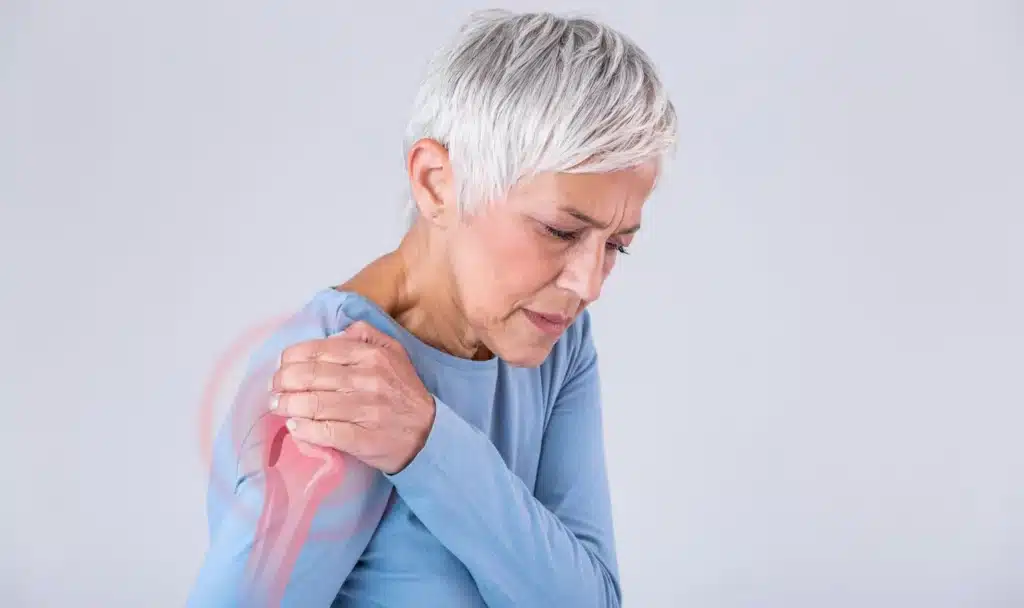|
Getting your Trinity Audio player ready...
|
Aging is a natural process that we all experience. Some of us age gracefully and have few health issues, and some of us have major health concerns as we age. So, why can our experiences be so different?
One key factor that greatly impacts our health and well-being as we age is inflammaging. Inflammaging is the accelerated aging process that occurs due to chronic inflammation in our bodies. As discussed in a previous blog, a variety of factors can cause inflammaging. These include genetics, environmental factors, and lifestyle choices.
Inflammaging can have a significant impact on your body. It can contribute to the development of diseases like heart disease, cancer, and osteoporosis.
In this blog, we will explore how inflammaging affects your heart, muscles, bones, joints, skin, and the interaction of menopause and inflammaging.
What is the relationship between Inflammaging and Your Heart?
Heart disease is the leading cause of death worldwide. A 2022 review reported that inflammaging has major impacts on the heart and blood vessels. Inflammaging can increase your risk for heart and blood vessel diseases like:
· Heart Attacks
· Hypertension
· Atherosclerosis
· Aortic Aneurysm
That review indicates that the major risk factors for heart inflammaging include:
· Smoking
· Diabetes
· Obesity
When inflammaging occurs, your heart and blood vessels change for the worse. Another 2022 review stated that the high levels of pro-inflammatory markers in your body cause changes like:
· Stiffness of the heart and blood vessels
· Poor mitochondrial function
· Weakening of the heart muscles
· Less able to respond to blood and oxygen needs of muscles and organs
Taking action to reverse inflammaging will reduce your risk of heart disease.
Inflammaging and your Muscles

Losing muscle is normal as we age. Yet, inflammaging causes greater muscle loss at earlier ages. A 2022 review found that inflammaging reduces your muscle cells’ ability to heal and regenerate muscle. Inflammaging can also reduce muscle function, performance, and range of motion to occur at earlier ages.
Why do these happen? The changes of your muscles due to inflammaging happen because of:
· Poor mitochondrial function
· Buildup of reactive oxygen species
· Poor cell signaling
· Poor muscle damage sensing
· Increased death of muscle cells
· Poor energy utilization
The combination of these limits the ability of your cells to activate, coordinate well, and heal your muscles. Exercise and proper nutrition limits the effects of inflammaging on your muscles.
Understanding how inflammaging occurs and how to reverse it will reduce your risk of losing significant muscle mass as you age.
Inflammaging and your Bones and Joints
Like other tissues in your body, inflammaging affects your bones and joints. Inflammaging contributes to age-related bone and joint issues like osteoporosis and osteoarthritis.
Osteoporosis occurs when your bone density declines, which increases the risk of fractures or breaking. A 2021 study found that inflammaging increases the risk of low bone density.
Osteoarthritis occurs when the cartilage of your joints breaks down to cause pain and limited joint movement. A 2019 study found that inflammaging increases the risk of cartilage destruction and joint pain.
The increased risk of bone fractures and joint pain can reduce your quality of life as you age. Exercise and proper nutrition are key to limiting the effects of inflammaging on your bones and joints.

- Access the Reverse Inflammaging Summit
Learn from top leaders in the field the skills you need today.
Inflammaging and Your Skin
As we age, our skin undergoes natural changes in look and function. A review published in 2020 identified that age-related changes in the skin include:
· Impaired wound healing
· Increased risk for cancer
· Less effective at preventing infections
· Decreased collagen production
· Less able to remodel skin fibers
With inflammaging, the high presence of pro-inflammatory cause these to occur earlier and to a greater degree. Inflammaging effects on the skin are more likely if you are exposed to excessive:
· UV radiation
· Smoke
· Pollutants
· Cuts or infections
Avoiding these and having consistent, healthy skin care techniques can reduce the risk of the effects of inflammaging. A 2015 review assessed 41 reports to determine an effective skin care routine. In general, they recommend that you:
· Clean your skin once daily
· When cleaning, use soaps that are mild (not alkaline)
· Moisturize as needed (2x a day in areas with dry skin)
· Use sunscreen when outdoors
Utilizing these skin care practices will reduce the effects of inflammaging on your skin. Consult your doctor if you have severe issues with your skin.
The Interaction between Inflammaging and Menopause

Women are known to have longer life expectancies than men. Yet, at older ages, women are more at risk of having limited function and worse quality of life. One primary factor is menopause.
Menopause is a natural process that women undergo when reproduce is no longer possible. After menopause, the levels of sex hormones, like estrogen, significantly decline. This increases the risk of postmenopausal women developing:
· Heart Disease
· High Blood Pressure
· Alzheimer’s Disease
· Other forms of Cognitive Impairment
· Depression
A 2023 review reports that inflammaging and the reduction of estrogen in menopause combine to intensify the risk of developing chronic diseases. Estrogen plays a critical role in protecting your heart, brain, and nervous system from disease.
Estrogen is known to protect your cardiovascular system by:
· Reducing inflammation
· Regulating blood vessel function
· Regulating heart muscle function
· Regulating immune responses to heart or blood vessel injury
The risk of developing heart disease is higher in women that have experienced reductions in estrogen due to menopause. A 2022 review found that postmenopausal women have 2-6 times greater risk of developing cardiovascular disease when compared to premenopausal women of the same age. Further, more women die than men within five years of experiencing a heart attack.
Estrogen is also extremely important for proper brain function. One review discusses that estrogen reductions due to menopause or oophorectomy may cause changes in the brain and the nervous system. These include:
· More pro-inflammatory markers in the brain
· Poor immune function of brain cells
· Poor function of the blood-brain barrier
Understanding how to limit the combined effects of inflammaging and menopause may reduce the risk of developing chronic diseases.
One commonly discussed method to limit the effects of menopause is estrogen replacement therapy (also called hormone replacement therapy). This therapy replaces the estrogen that declines during menopause.
A 2022 review discusses that this therapy is time-dependent. This means that estrogen replacement therapy is most effective when it is started during menopause and continued for 5-30 years. If estrogen replacement therapy was performed like this, all-cause mortality was found to be lower while quality of life was better.
This review also discussed that there were reports of complications with estrogen replacement therapy when it was performed in women that were already postmenopausal and already had heart disease. It is important to consult your doctor to understand how this therapy may affect you.
It is clear to see that inflammaging causes many different effects in the body. As mentioned in a previous blog, lifestyle modifications and seeking appropriate treatment for health concerns are key to limiting the effects of inflammaging on your body.
Daniel Chantigian, MS, is exploring the science, causes, and effects of inflammaging. This blog is the fourth part of a four-part series.
References
- Barcena, M. L., Aslam, M., Pozdniakova, S., Norman, K., & Ladilov, Y. (2022). Cardiovascular Inflammaging: Mechanisms and Translational Aspects. Cells, 11(6): 1010. https://doi.org/10.3390/cells11061010
- Puspitasari YM, Ministrini S, Schwarz L, Karch C, Liberale L, Camici GG. (2022) Modern Concepts in Cardiovascular Disease: Inflamm-Aging. Front Cell Dev Biol. https://pubmed.ncbi.nlm.nih.gov/35663390/
- Antuña E, Cachán-Vega C, Bermejo-Millo JC, Potes Y, Caballero B, Vega-Naredo I, Coto-Montes A, Garcia-Gonzalez C. (2022). Inflammaging: Implications in Sarcopenia. Int Jour of Mol Sci, 23(23):15039. https://doi.org/10.3390/ijms232315039
- Pilkington SM, Bulfone-Paus S, Griffiths CEM, & Watson REB. (2021). Inflammaging and the Skin. J Invest Dermatol. 141(4S):1087-1095. https://www.jidonline.org/article/S0022-202X(20)32294-6/fulltext
- Lichterfeld A, Hauss A, Surber C, Peters T, Blume-Peytavi U, Kottner J. (2015). Evidence-Based Skin Care: A Systematic Literature Review and the Development of a Basic Skin Care Algorithm. J Wound Ostomy Continence Nurs.42(5):501-24. https://pubmed.ncbi.nlm.nih.gov/26165590/
- Rezuș, E., Cardoneanu, A., Burlui, A., Luca, A., Codreanu, C., Tamba, B. I., Stanciu, G. D., Dima, N., Bădescu, C., & Rezuș, C. (2019). The Link Between Inflammaging and Degenerative Joint Diseases. International journal of molecular sciences, 20(3), 614. https://doi.org/10.3390/ijms20030614
- Epsley, S., Tadros, S., Farid, A., Kargilis, D., Mehta, S., & Rajapakse, C. S. (2021). The Effect of Inflammation on Bone. Front in Physiol, 11, 511799. https://www.frontiersin.org/articles/10.3389/fphys.2020.511799/full
- Hodis, H. N., & Mack, W. J. (2022). Menopausal Hormone Replacement Therapy and Reduction of All-Cause Mortality and Cardiovascular Disease: It Is About Time and Timing. Cancer journal (Sudbury, Mass.), 28(3), 208–223. https://www.ncbi.nlm.nih.gov/pmc/articles/PMC9178928/
- Olivieri F, Marchegiani F, Matacchione G, Giuliani A, Ramini D, Fazioli F, Sabbatinelli J, Bonafè M. (2023). Sex/gender-related differences in inflammaging. Mech Ageing Dev. 211:111792. https://www.sciencedirect.com/science/article/abs/pii/S0047637423000180
- Au A, Feher A, McPhee L, Jessa A, Oh S, Einstein G. (2016). Estrogens, inflammation and cognition. Front Neuroendocrinol. 40:87-100. https://www.sciencedirect.com/science/article/pii/S0091302216300024?via%3Dihub



Wow, Robert Lufkin, MD and Stepeh Sideroff, PhD hosted the Reverse Inflammaging Summit. Their deep dive into inflammaging really puts into perspective how chronic inflammation accelerates aging and its impacts on our bodies! 😲🔥 From increasing the risk of serious conditions like heart disease and osteoporosis to affecting our muscles, bones, joints, and even our skin, inflammaging seems like a villain out of a superhero movie. 🦸♂️💔
It’s super interesting to learn that factors like smoking, diabetes, and obesity can ramp up inflammaging, and simple actions like exercising and eating right can help keep it at bay. 🥦🏋️♀️ Plus, the bit about menopause and how it interacts with inflammaging adds another layer to the puzzle of aging, especially the role estrogen plays in protecting against diseases. 💔👩
The idea of a Reverse Inflammaging Summit sounds like a fantastic opportunity to learn about delaying aging and increasing healthspan. I mean, who wouldn’t want to manipulate time in their favor? ⏳✨
What’s everyone’s take on integrating simple lifestyle changes to combat inflammaging? Have you noticed a difference in your health by following any specific routines? Let’s share and learn from each other! 🌟👥